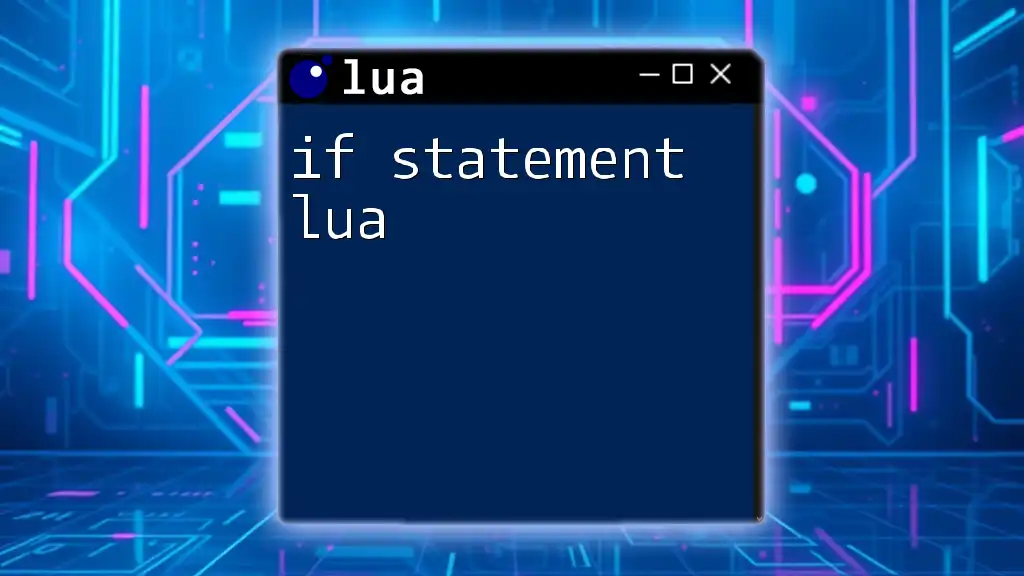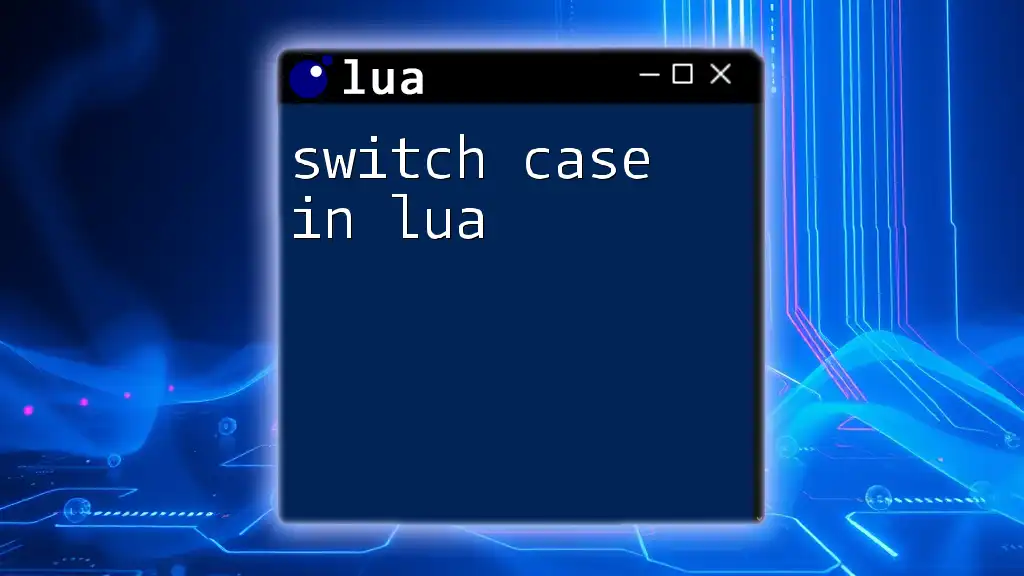In Lua, the `mean` function is typically used to calculate the average of a set of numbers, which can be implemented by summing the numbers and dividing by the count of those numbers.
Here's a simple implementation of a mean function in Lua:
function mean(values)
local sum = 0
for _, value in ipairs(values) do
sum = sum + value
end
return sum / #values
end
-- Example usage
local numbers = {4, 8, 15, 16, 23, 42}
print(mean(numbers)) -- Output: 18
Understanding Functions in Lua
What is a Function?
A function is a fundamental building block in programming that allows you to encapsulate a piece of code designed to perform a specific task. Functions play a crucial role in organizing your code, allowing for reusability, and improving overall readability. In Lua, you define functions using the `function` keyword, followed by the function name and parentheses that may contain parameters.
Creating Functions in Lua
Creating a function in Lua is straightforward. The syntax typically looks like this:
function functionName(parameters)
-- code to be executed
end
For example, a simple function to greet someone might be written as follows:
function greet(name)
return "Hello, " .. name
end
In this function, `greet` accepts a single parameter called `name` and returns a greeting message. The `..` operator is used to concatenate strings, enhancing the function's utility.

The Concept of `mean` in Programming
What Does `mean` Represent?
In the context of statistics, the mean refers to the average of a set of numbers. It serves as a measure of central tendency and is widely used in data analysis, helping to summarize large datasets into a single representative value. Understanding how to calculate the mean allows programmers and data analysts to draw meaningful insights from their data.
How `mean` is Typically Implemented
Unlike many other programming languages like Python or JavaScript, Lua does not include a built-in `mean` function. Instead, you need to implement it manually. This is a great opportunity to learn how to create your individual functions tailored to specific needs.

Implementing `mean` in Lua
Creating a Custom `mean` Function
To compute the mean in Lua, you can develop a custom function that accepts a table of numbers as input. Here’s the step-by-step process:
- Calculate the Sum: Loop through the table, adding all the numbers.
- Count the Entries: Get the total number of elements in the table.
- Calculate the Mean: Divide the sum by the count of numbers.
Here’s how you could implement the `mean` function in Lua:
function mean(numbers)
local sum = 0
for _, num in ipairs(numbers) do
sum = sum + num
end
return sum / #numbers
end
In this function:
- `local sum = 0` initializes a variable to hold the cumulative sum of the numbers.
- The `for` loop iterates through each number in the table `numbers`, adding each to `sum`.
- Finally, `return sum / #numbers` computes the average by dividing the total by the length of the table.
Testing the Custom `mean` Function
Once you’ve created your `mean` function, it's essential to test it to ensure it works correctly. Here’s how to call the function and display the result:
local data = {1, 2, 3, 4, 5}
print("Mean:", mean(data)) -- Output: Mean: 3
In this snippet, you create a table named `data` containing five numbers. When you run the code, it outputs `Mean: 3`, demonstrating the function’s effectiveness in calculating the average of the provided numbers.

Practical Use Cases of the `mean` Function
Statistical Analysis
Calculating the mean is often crucial in data analysis, particularly in studies where you need to summarize information succinctly. For instance, if you're analyzing test scores, understanding the average score can provide insights into overall student performance.
Game Development
In game development, the `mean` function can be useful for various mechanics. For example, if you're tracking player actions, you can calculate the average score across multiple games to adjust difficulty or reward systems based on player performance.

Best Practices When Writing Functions in Lua
Naming Conventions
It’s essential to follow clear naming conventions when creating functions. Functions should have descriptive names that convey their purpose to enhance code readability. For example, naming your function `calculateMean` is more intuitive than just `meanCalc`.
Comments and Documentation
Commenting your code is a critical practice for maintainability. Detailed comments help explain the purpose and functionality of your code to others (or your future self!). Here's an example of how you might document your `mean` function:
-- Function to calculate the mean of a list of numbers
-- @param numbers: A table containing numerical values
-- @return The mean of the provided numbers
function mean(numbers)
...
end
These comments provide context, making it easier to understand how the function operates and what inputs it requires.

Conclusion
Understanding what does mean in Lua enables you to harness the power of statistical analysis within your programming endeavors. By creating and utilizing custom functions like `mean`, you can streamline your processes and gain deeper insights from your data. As you continue learning, remember to experiment with different applications for the `mean` function and explore Lua's vast capabilities.

Resources for Further Learning
To enhance your skillset in Lua programming, consider exploring the following resources:
- Recommended books on Lua
- Online tutorials and courses
- Community forums and programming groups where you can connect with other Lua enthusiasts
Dive deeper into the world of Lua programming and elevate your coding capabilities!

















